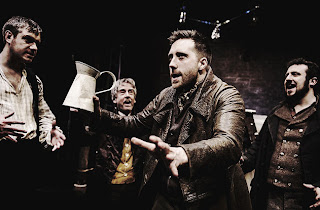For the second half of simple8's residency at the Arcola, Sebastian Armesto tackles Herman Melville's Moby-Dick. Almost the entire ensemble from The Cabinet of Dr Caligari returns, although as this is very much a story drenched in testosterone as much as it is in sea-water, the two women in the cast have been replaced by Nicholas Bishop as Starbuck, the first mate who tries to provide a voice of reason, and Leroy Osei-Bonsu as Queequeg, the enormous African cannibal (lapsed) who makes for an odd-couple pairing with the bookish narrator, Sargon Yelda's Ishmael. Needing to supplement his income from teaching, Ishmael chooses whaling as an unlikely spot of moonlighting. Being thrown together with Queequeg, the latter's prayers direct them to the Pequod, owned by a pair of eccentrics and captained by the single-minded Ahab.
Having lost a leg to an unusually powerful, white sperm whale known as Moby-Dick, Captain Ahab (Joseph Kloska) is obsessed with taking out his revenge on the creature. Using a combination of rousing speeches and outright bribery, he convinces his crew to risk their lives and essentially abandon their work to go after a single whale that legend has it holds grudges and can sink whole ships.
simple8 are regulars at the Arcola and their grungy aesthetic is a great match to the industrial space. For the first time Moby-Dick sees them let loose in the new building's larger Studio 1, and its high ceilings, bare brickwork, exposed beams and raised platforms are used to their best advantage in building the entire set from scrap in the course of the play, and creating the innovative visuals I've come to associate with the company - surely the most memorable image here is the whale itself, constructed out of broken planks of wood. The music and sound effects are similarly live and rough-and-ready, from the sea shanties that punctuate the story to the tapping of Ahab's ivory leg.
As I recall, the original novel's great length is largely down to the extreme (and tedious) detail Melville goes into about the day-to-day business of whaling, so any two-hour adaptation is going to benefit from cutting down to the most exciting stuff in the story. However the suggestion of these technical details that's been kept by Armesto, in the form of an endearingly geeky lecture from Ishmael, seems very canny, and particularly appropriate to simple8 - as an avowedly "green" theatre company with a particular goal of being energy-efficient, the gleeful descriptions of killing the animals and pulling them to pieces because it's "necessary" to light people's lamps, fuel at any expense, has an ongoing contemporary relevance, particularly in the light of what we now know about the toll the practice took on whale populations.
Maybe it's partly because the Arcola's much-publicised new boiler hasn't entirely taken the chill out of the air in Studio 1, but the play's climax even brought me out in a few goosebumps. The story works both as thriller and environmental allegory, as well as having lighter moments through the music and comic interludes, like the visit from Oliver Birch's ever-so-British Captain Boomer, a pragmatic counterpart to Ahab, whom Kloska convincingly shows becoming increasingly unhinged and dangerous.
Moby-Dick by Sebastian Armesto, based on the novel by Herman Melville, is booking until the 4th of May at Arcola Studio 1.
Running time: 2 hours 5 minutes including interval.




No comments:
Post a Comment